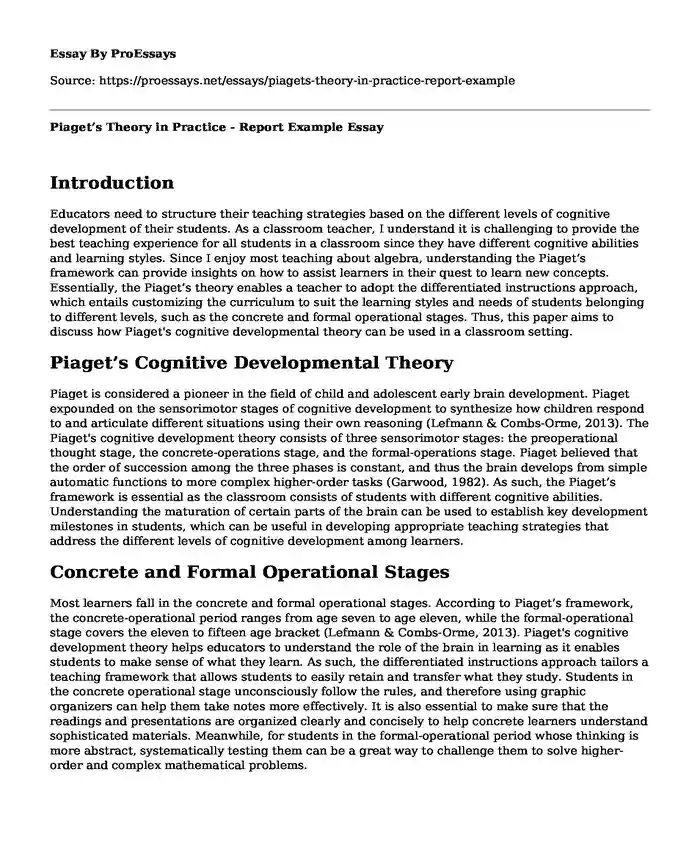Introduction
Educators need to structure their teaching strategies based on the different levels of cognitive development of their students. As a classroom teacher, I understand it is challenging to provide the best teaching experience for all students in a classroom since they have different cognitive abilities and learning styles. Since I enjoy most teaching about algebra, understanding the Piaget’s framework can provide insights on how to assist learners in their quest to learn new concepts. Essentially, the Piaget’s theory enables a teacher to adopt the differentiated instructions approach, which entails customizing the curriculum to suit the learning styles and needs of students belonging to different levels, such as the concrete and formal operational stages. Thus, this paper aims to discuss how Piaget's cognitive developmental theory can be used in a classroom setting.
Piaget’s Cognitive Developmental Theory
Piaget is considered a pioneer in the field of child and adolescent early brain development. Piaget expounded on the sensorimotor stages of cognitive development to synthesize how children respond to and articulate different situations using their own reasoning (Lefmann & Combs-Orme, 2013). The Piaget's cognitive development theory consists of three sensorimotor stages: the preoperational thought stage, the concrete-operations stage, and the formal-operations stage. Piaget believed that the order of succession among the three phases is constant, and thus the brain develops from simple automatic functions to more complex higher-order tasks (Garwood, 1982). As such, the Piaget’s framework is essential as the classroom consists of students with different cognitive abilities. Understanding the maturation of certain parts of the brain can be used to establish key development milestones in students, which can be useful in developing appropriate teaching strategies that address the different levels of cognitive development among learners.
Concrete and Formal Operational Stages
Most learners fall in the concrete and formal operational stages. According to Piaget’s framework, the concrete-operational period ranges from age seven to age eleven, while the formal-operational stage covers the eleven to fifteen age bracket (Lefmann & Combs-Orme, 2013). Piaget's cognitive development theory helps educators to understand the role of the brain in learning as it enables students to make sense of what they learn. As such, the differentiated instructions approach tailors a teaching framework that allows students to easily retain and transfer what they study. Students in the concrete operational stage unconsciously follow the rules, and therefore using graphic organizers can help them take notes more effectively. It is also essential to make sure that the readings and presentations are organized clearly and concisely to help concrete learners understand sophisticated materials. Meanwhile, for students in the formal-operational period whose thinking is more abstract, systematically testing them can be a great way to challenge them to solve higher-order and complex mathematical problems.
Conclusion
Teachers should continually learn to see their students as individuals rather than as a group. Adopting such a mindset is crucial as it helps the teacher to teach with the student's needs in mind. A one-size-fits-all approach to teaching often neglects the student's needs, and thus the learning experience can be excruciating and boring for learners with different cognitive abilities and learning styles. Besides, students learn in different ways, and therefore it is important to adapt the content and curriculum in response to learner's learning profile, readiness, and interests.
References
Garwood, S. G. (1982). Piaget and play: Translating theory into practice. Topics in Early Childhood Special Education, 2(3), 1-13.
Lefmann, T., & Combs-Orme, T. (2013). Early brain development for social work practice: Integrating neuroscience with Piaget's Theory of Cognitive Development. Journal of Human Behavior in the Social Environment, 23(5), 640-647.
Cite this page
Piaget's Theory in Practice - Report Example. (2023, Dec 07). Retrieved from https://proessays.net/essays/piagets-theory-in-practice-report-example
If you are the original author of this essay and no longer wish to have it published on the ProEssays website, please click below to request its removal:
- Essay Sample on Cognitive Habits in Critical Thinking
- Research Paper on Autism Spectrum Disorder: Challenges in Communication and Social Engagement
- Schizophrenia & Time Perception: Research Paper
- Mental Health Challenges in the COVID-19 Pandemic: 45% of US Adults Affected - Essay Sample
- Paper Example on Behavior Intervention Plans: Acquiring New Behavior & Knowledge
- Romantic Story: Rush - Free Paper Sample
- Piaget's Theory in Practice - Report Example







